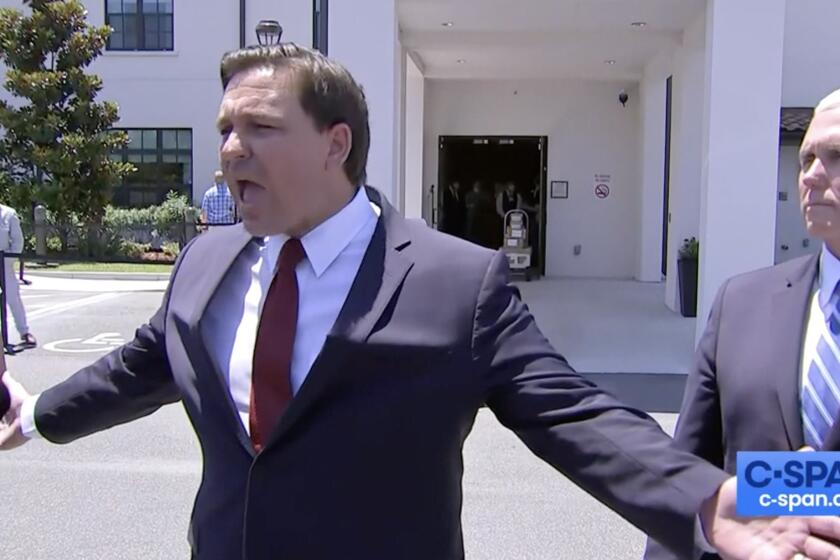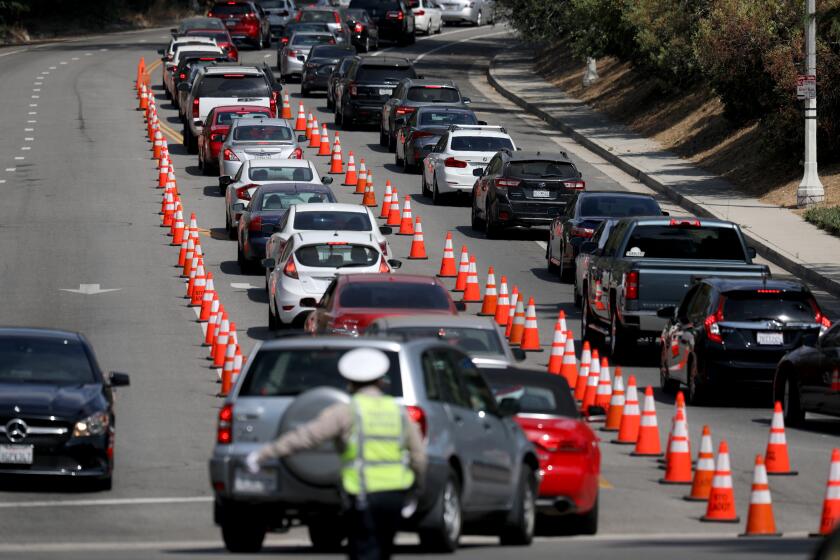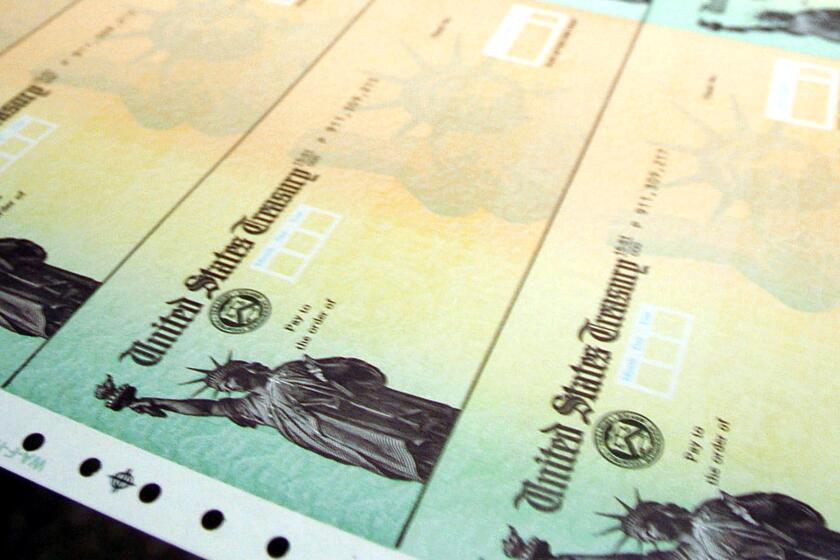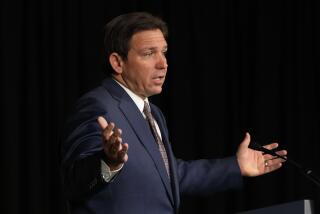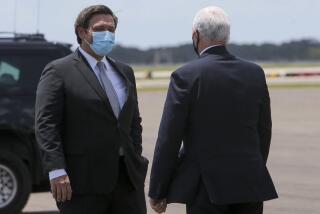Column: My apology to Florida Gov. DeSantis: Sorry, you’re even worse than I imagined
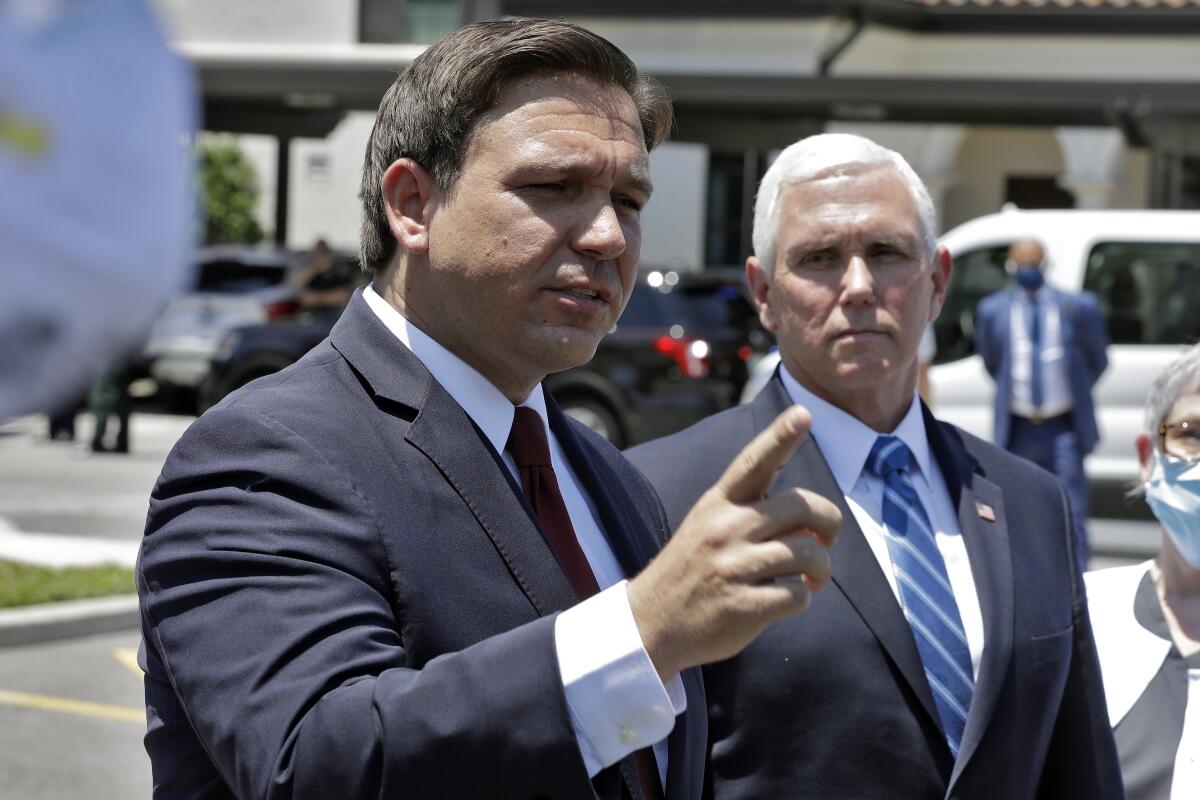
The trophy for outstanding self-own in coverage of the ongoing coronavirus pandemic may well have been secured by Rich Lowry, the editor of the conservative National Review, for a May 20 article headlined, “Where Does Ron DeSantis Go to Get His Apology?”
Lowry’s goal was to defend the Tea Party-backed Republican governor’s approach to the coronavirus crisis. DeSantis has “taken this seriously from the beginning, been immersed in the data and research, and crafted a well-considered response,” Lowry wrote in an editorial accompanying the full article.
Nevertheless, “The media has been portraying DeSantis as a yokel who was going to get Floridians killed with his lax approach,” Lowry continued. “The conventional wisdom has begun to change about Florida, as the disaster so widely predicted hasn’t materialized.”
We’ve succeeded, and I think that people just don’t want to recognize it because it challenges their narrative.
— Florida Gov. Ron DeSantis, declaring victory over the coronavirus on May 20
Lowry thus managed simultaneously to display his own cluelessness about the emerging catastrophe and set up DeSantis for a major reckoning. That’s because the widely predicted disaster has now swept over Florida in full cry. Lowry, and DeSantis, declared victory much too early.
On Friday, state health officials confirmed 8,942 new COVID-19 cases, “nearly doubling the previous record of cases reported in a single day, two days earlier,” reports the Miami Herald.
The percentage of tests coming back positive for COVID-19 also has soared, to 14.74% on Friday. That’s well above the 10% threshold that public health officials say hints at an infection rate coming under control, and well above the national average of 5.5%.
We’ve reported on DeSantis’ strategy and his confidence in its wisdom before. Then, and now, we don’t mean to pick on DeSantis for the surge in the pandemic within his state’s borders. He’s not the only governor to be grappling unsuccessfully with the coronavirus.
Infections have surged in other red states, notably Texas and Arizona, and in blue states too.
The coronavirus has outsmarted governors who opened their states too early -- almost all of them.
California, where Gov. Gavin Newsom instituted a first-in-the-nation stay-at-home order and has supported social distancing measures and the use of masks in public — and issued a mandatory mask order on June 16 — has experienced an alarming increase in cases.
As my colleague Taryn Luna reported, the number of hospitalized patients in California jumped 32% in the last two weeks to 4,240, double the two-week increase of 16% that Newsom had reported on Monday. The state’s ratio of positive tests, however, has remained steady at about 5.1%.
Overall, 33 states are experiencing rising caseloads, so politics isn’t necessarily the sole defining factor in the battle.
These trends point to the difficulty political leaders face in encouraging socially responsible antipandemic behavior, such as staying home and wearing masks, among residents who have become weary of restriction, especially against the backdrop of limited or no progress against the virus.
In California, Newsom has had to accommodate local officials and constituents who resist these policies by allowing them to reopen commercial establishments and public spaces even where the coronavirus is plainly not under control.
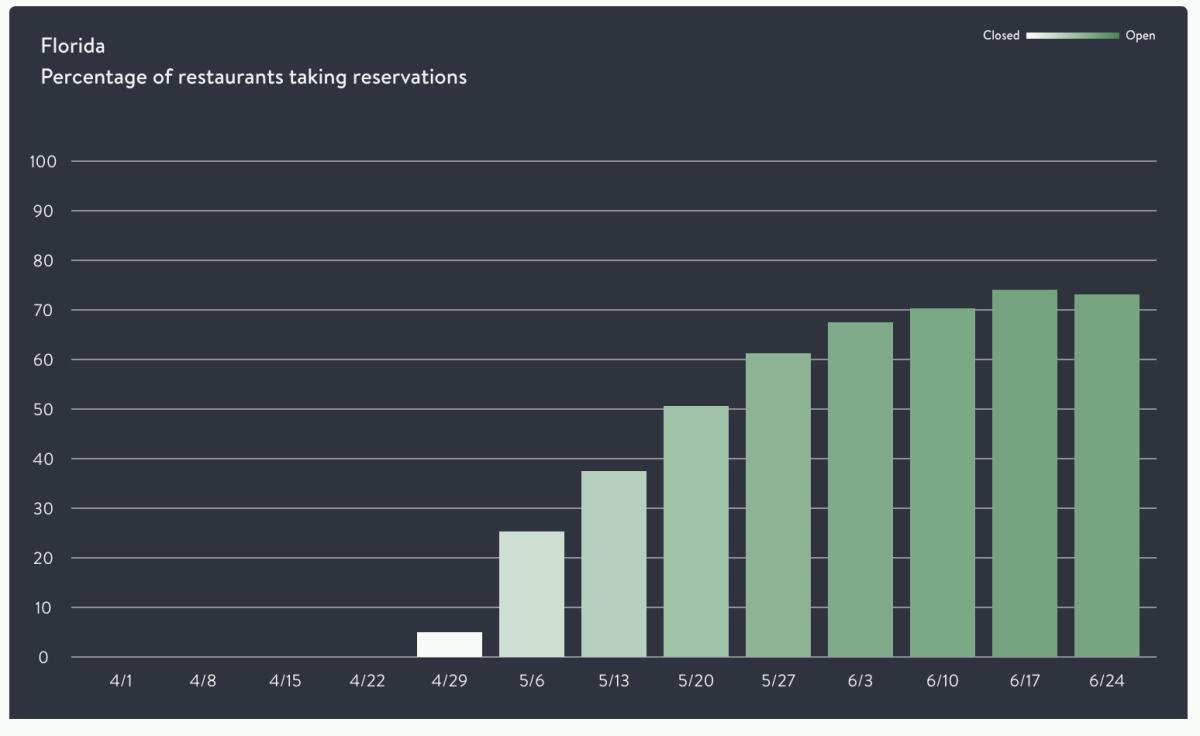
So what makes DeSantis a special case? It’s that he’s a governor who turned the battle against COVID-19 into a political issue.
The chief politicizer of the battle, of course, has been President Trump, who from the start has depicted the crisis as a personal affront, treated antivirus measures as political darts aimed at himself, utterly refused to set an example for the public by participating in them, and portrayed success against the pandemic as political validation.
Now that the battle is being lost and more than 120,000 Americans have perished from the coronavirus on his watch, Trump is largely missing in action, as is the rest of his administration.
Consider how things might have turned out differently had he simply advised Americans to don masks in public and done so himself, as a model. Thousands of lives might have been saved and the notion that going about barefaced was some sort of political statement would have been stifled in its crib.
DeSantis has played the part of an apprentice Donald Trump for much of the pandemic period. He personalized criticism of the state’s policies, as though it was all about him. He groused about having been the target of a “typical partisan narrative” forecasting a surge in disease cases tied to a purportedly premature reopening of Florida by commercial businesses and recreation areas.
Trump is determined to overthrow the Affordable Care Act, a move that would rip health coverage from some 23 million Americans during a pandemic.
He complained that the media had “waxed poetic for weeks and weeks about how Florida was going to be just like New York,” and boasted that it was anything but.
His March 24 order requiring visitors from New York, New Jersey and Connecticut to quarantine for 14 days, aimed at “individuals fleeing to Florida from states where ‘shelter-in-place’ orders are being implemented, including from the New York Tri-State Area,” seemed to play to a red state vs. blue state mentality.
That was especially so since Florida had thrown its beaches open to spring break carousing that threatened to export the disease nationwide. (Now the shoe is on the other foot, as Northeastern states that eventually brought their cases under control have imposed quarantines on travelers from Florida.)
“We’ve succeeded,” DeSantis said on May 20, “and I think that people just don’t want to recognize it because it challenges their narrative.” That was the day that Lowry published his paean to DeSantis’ superior wisdom in the National Review.
Other Republican governors played the same game. Like Trump, some of these governors tried to stem the pandemic by limiting the public’s access to data, firing statistical analysts or even manipulating the figures.
Some went even further than DeSantis by actively interfering with local antivirus efforts. Arizona’s Republican Gov. Doug Ducey forbade localities to require masks, though he lifted the restriction a week ago.
Ducey promoted the idea that the coronavirus was under control by lifting the state’s stay-at-home order on May 15, despite warnings that was premature. Ten days later, the state’s caseload began rising, reflecting the median time frame between exposure and symptoms. Arizona is now the nation’s leading hot spot of infection growth.
A glitch in the Social Security formula means a longterm coronavirus-related benefit cut for some workers
In Texas, Republican Gov. Greg Abbott oversaw one of the most recklessly inept responses in the nation. He didn’t issue a stay-at-home order until April 2, then lifted it on April 30. He also forbade local officials to impose mask-wearing rules.
Texas has joined Arizona and Florida among the nation’s top hot spots. Now all three are trying to step back from the brink. Ducey and Abbott have slowed their states’ reopening. Abbott shut Texas bars back down, ordered restaurants to scale back capacity by 50% and banned outdoor gatherings of more than 100 people. DeSantis banned the sale of alcohol at Florida bars.
Yet the damage has been done. All three governors either explicitly or implicitly promoted the notion that behavior such as mask-wearing was a matter of individual choice, a warped expression of “peersonal freedom.”
Freedom to infect your neighbors and become infected yourself, however, is no freedom at all. The political leaders who downplayed the magnitude of this public health crisis, took no action or blocked intelligent action, and preened about the liberty they afforded their states were playing politics for no other reason than personal gain. The virus is no respecter of politics, and it is making their constituents pay for their leaders’ dereliction of duty.
More to Read
Inside the business of entertainment
The Wide Shot brings you news, analysis and insights on everything from streaming wars to production — and what it all means for the future.
You may occasionally receive promotional content from the Los Angeles Times.
